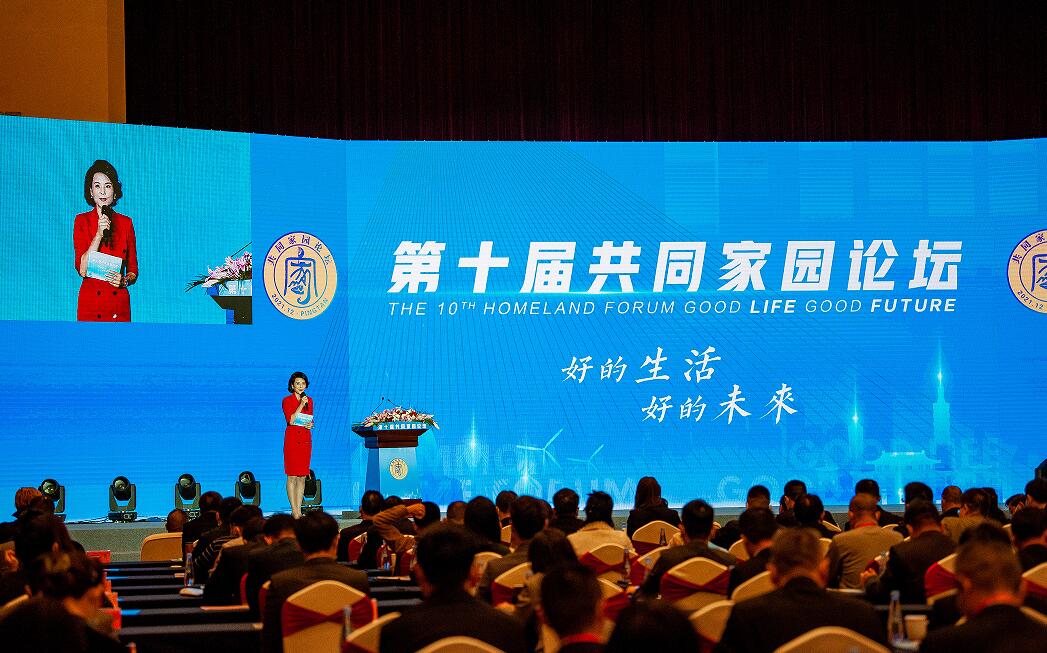Stories on Pingtan, a cross-Straits common homeland
en.ptnet.cn | Updated:2021-12-17
Pingtan, the closest place on the Chinese mainland to the island of Taiwan, hosted the 10thCommon Homeland Forum on Dec. 12. [Photo by Jiang Xinheng]
Pingtan, the closest place on the Chinese mainland to the island of Taiwan, hosted the 10th Common Homeland Forumon Dec.12, with case studies presented by key speakers from all walks of life, centering on four aspects: "trading","entrepreneurship","shared origin", and "grassroots governance". A panel of guest experts gave their insights into Pingtan's potential outlook for compatriots from Taiwan and a sustainable development plan for Pingtan.
On trading
With the advantages of intensive, fast and stable shipping to Taiwan, Pingtan Port has become the top choice for companies to carry out cross-Straits trade.
Wang Renjie, general manager of Lantai Cross-Straits Marine Express Co., Ltd., said: “Pingtan rolled out incentives for the entire logistics chain. Pingtan’s cross-Straits logistics features low cost by ship cum high efficiency by air.”
Su Meixiang, director of the Institute of the Contemporary Taiwan of the Fujian Academy of Social Sciences, commented, “Pingtan’s cross-Straits logistics industry has achieved remarkable achievements. The Pingtan-Taiwan-Global logistics in the pipeline should consolidate its foundation, bring the role of a logistics hub into play, take the initiative to link up RCEF, and integrate into the construction along the Belt and Road. All pro-Taiwan policies should be well-implemented to ensure that Taiwan enterprises enjoy the same treatment on the mainland.
On entrepreneurship
Pingtan provides strong support for Taiwanese youth and enterprises in terms of office space, funds, and talents engagement, and builds a cross-Straits entrepreneurship and employment platform to encourage Taiwanese youth to take root in Pingtan. Up to now, more than 1,200 Taiwan-funded enterprises have registered in Pingtan. Pingtan is gradually becoming an anchorage for young entrepreneurs on both sides of the Straits to pursue their dreams.
Pan Jianwen, deputy general manager of the Di San Jing Tourism Development Company, came to Pingtan for the first time in 2019 and decided to stay to start his own business. The company runs three homestay hostels in Pingtan. Pan said that opportunities arise only when people step out of their comfort zone and act. “I hope to introduce more Taiwanese youth to meet Pingtan and the future.
Xu Quan, an entrepreneurial mentor, remarked, "The timing was just right when Di San Jing took the "free ride" along with the waves of development in Pingtan. So the homestay can get to share its success with young people from both sides of the Straits, once again attesting to the conducive entrepreneurial environment of Pingtan. His story will inspire more youth to join and build the homeland together."
On shared origin
Pingtan is one of the earliest known origins of the Austronesian in the world. Fan Xuechun, director of the International Austronesian Institute in Pingtan, said in a speech that from a geographical perspective, Taiwan and the mainland have always been a community of shared destiny since ancient times. In fact, from an archaeological perspective, they share a similar origin.
Fan Xuechun suggested that in the future, Pingtan can use the Austronesian archeological base to enhance cultural exchanges with the regions and countries where the Austronesian lineages are rooted. This is of great significance for deepening economic and trade exchanges, promoting the peaceful reunification of the Chinese nation, and building a community with a shared future for mankind.
Wang Zhizhong, chairman of the Xiangyang Charity Foundation, echoed that the forum was not merely meant for the discussion on theconstruction of a common homeland between Fujian and Taiwan, but also bear the responsibility of disseminating the spirit of the “Belt and Road”to a wider area through the Austronesian culture.
Wang Zhizhong expressed that he hopes to create musicals combining Austronesian and “Sea Sparkle”, and push forward the implementation of the International Ocean Music Festival in Pingtan. Meanwhile, he proposed that Pingtan give full play to its role asa window to the outside world and create a cultural and art fair. Diverse cultural activities help advance the construction of Pingtan into an international tourism island.
On grassroots governance
"Pingtan is my home. Here,I find the direction and strength to pass on." This is what Taiwan compatriot Blues Chen feels in Pingtan.
In recent years, Pingtan has actively explored new ways to assimilate Taiwan's grassroots governance into its own. It has introduced Taiwan's grassroots governance professionals to serve as community builders in villages. Blues Chen is one of them.
As a former musician, cultural and creative instructor, and a teacher versed in the Internet of Things, after coming to Pingtan, Blues Chen devotes to the construction of the cultural community with the introduction of cultural creatives and music. "I hope to bring my expertise and ideal to the villages."
Now, the cross-Straits grassroots integration pilot has covered 40 percent of the villages in Pingtan, making room for more youth from Taiwan to realize their aspirations.
Ma Yanbin, dean of the Research Institute for Cross-Straits Integration and Development of Yango University, and former director of the Public Policy Institute of Feng Chia University in Taiwan, said that although Blues Chen did not continue to be a musician and teacher, he has brought music to the community and the village, as well as education. "The mainland is full of possibilities. Taiwanese youth can show their capabilities here.
Spotted a mistake or want to add something? All rights reserved. Do not reproduce our content without permission–you can contact us directly on our Facebook messenger or Twitter mailbox. Follow @pingtanchina (Facebook/Twitter)

 Fujian Public Security Registration Code: 35012802000271
Fujian Public Security Registration Code: 35012802000271